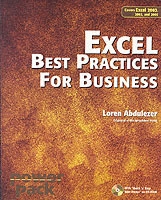Spreadsheets have become the de facto standard for communicating business information and the preferred tool for analyzing business data. In this current climate, the accuracy and clarity of spreadsheets are paramount. However, busy managers have little time to sift through heaps of reference books to extrapolate techniques for making polished spreadsheets. Even with finished spreadsheets in hand, managers and business professionals still need a book which holds up a mirror to their real world situations and reflects hidden flaws; and then takes the next step and guides the reader in specific ways to rework these critical documents. Excel Best Practices for Business enables readers to examine their work and ask critical questions. And once asked, this book also answers with dynamic, practical approaches and provides Take-Aways extrapolated from real situations across a managerial spectrum, making this book more mentor than reference. In this book, a critical need is met.
Book Highlights:
XML in Microsoft Office Excel 2003: Entirely new to Excel 2003 is major support for XML, making Excel truly web capable and Internet ready. This book provides extensive coverage of these new features from a hands-on perspective. It identifies subtleties, gotchas and problems, and shows you practical solutions and workarounds. SPREADSHEET PORTALS: This book introduces the topic of Spreadsheet Portals, which elevates spreadsheet practices for the Internet-ready software to the next level. Aside from explaining the basic concepts and principles of Desktop Client Portals, best practice techniques for building your portal pages and reference implementations are provided. These reference implementations, sample spreadsheets, and online demos are provided on the book's CD. SPREADSHEET MAKEOVERS: What do you do when your manager or boss asks you to take over a complex, spreadsheet-based application and send out reports every two weeks? The person who created the spreadsheet no longer works for the company. Aside from a few emails, there's no documentation. You look at the spreadsheet and you find it has flaws. Never mind about fixing the old reports; the new ones are going to go out with your name on it. This report is not your prime responsibility. You do not have the time or resources to turn this into a whole project, yet you can't afford to leave it the way it is. Excel Best Practices for Business provides a step-by-step approach to these "Mission Impossible" situations and walks you through the steps with fully worked out examples. ASSISTIVE TECHNOLOGIES: For the first time in a mainstream book, the topic of preparing accessible spreadsheets for individuals with disabilities is addressed. Government agencies needing to make electronic information section 508 compliant and corporations choosing not to alienate communities with special needs will find the techniques presented invaluable. You will learn from a hands-on perspective how to organize and design accessible spreadsheets for the visually impaired that will work with Screen Reader software, how to set up Screen Reader software, and how to build graphical components that will work with Screen Readers. These practices are carried to the next level with the introduction of Assistive Portals. This allows you to make spreadsheets accessible and avoid having to alter your original spreadsheets. The Portal Page does all the work. Because it is table driven, there are no formulas or scripts to modify. Think of how this will change the economics of preparing accessible documents. There are many more topics in Excel Best Practices For Business including: practical techniques for visualizing hard-to-present data, incorporating "Smart Data" into your spreadsheets, how to build a Data Overpass, quantification of uncertainty, conversion of mountains of legacy data into manageable and useful form, spreadsheet auditing to validate the work of others, a hands-on approach to working with the Excel Solver tool, spreadsheet construction techniques through both simple design and large, complex applications. If you want to find about these and many other techniques covered, then Excel Best Practices for Business is the perfect guide!
Åtkomstkoder och digitalt tilläggsmaterial garanteras inte med begagnade böcker





















